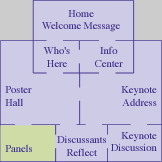Posted by:
Susan Cohen
Posted on: May 01, 2002 at 3:01 PM
Message:
I have been involved as an evaluator in a great array of systemic reform programs, funded by NSF and other agencies and foundations. I have witnessed dedicated people exert heroic leadership to accomplish what did not seem possible, to change district curriculum resources, ideas about quality teaching and evidence of genuine learning, etc.
I have also watched as those efforts have been defeated in no more than a few months, with the arrival of a district leader with different priorities and interests. My colleagues and I have a lot of data and findings that describe why and how defeat of reforms occur at the district level but I cannot help but wonder why we educators continue to let that happen. I think about other significant groups in our society that would fight hard to hold onto their accomplishments, waging a public campaign, hold town meeting types of public hearings and conversations, use write in campaigns, etc. to fight back. I think that educators have to react as if we are a powerful political community and change the topic of the conversation. I applaud the attention in this presentation to the core problem of building consensus as it seems represented in these remarks. The greatest challenge to sustaining the vision of reform seems to reside in building agreement or consensus, but that cannot be done based solely on parents' and others' personal interests and their own direct experiences of school but rather by some vision of the schooling outcomes for the larger society. It is clear that there are multiple pathways to effective teaching and genuine learning that stress certain common features. These features have been increasingly addressed by the growing numbers of curriculum programs designed to address the goals of teaching and learning as iterated in the national standards and current and past education and other research. Among those features are direct, concrete experiences with the phenomena and concepts being studied, dialogue and reflection about those experiences and other kinds of experiences that require organizing and communicating that understanding. There are many ways to engage in these activities. Those variations (which can include technolgoy) are important for supporting the diversity of learners and learning needs that populate all classrooms. Each of the areas relating to how to educate are strategies. The urgent public conversation needs to focus more on the goals or social purposes of learning and the role of schools in that learning rather than leading to conflict about the specific curriculum programs that may or may not be useful to achieve the outcomes. Local district, community conflict about the specific learning goals may always exist, but the discussion about the big ideas of ed reform has been kept hidden by these local discussions.
While all education may be local, the need for quality public education is a national issue. Good programs that fit in with the larger purposes of creating an educated populace are harder to remove from schools if they are truly serving the goals and intentions of our society. I have been reflecting on Bush's statement about educating all students. A presidential statement about educating all students says something to the public about the president's priorities, but does not speak to the need for ongoing public dialogue about what those priorities mean for all schools, teachers, communities, and the ed system. I can't imagine anyone disagreeing publicly that all children should be educated but I know that many people who disagree can hide their own priorities because there is no other PUBLIC forum in which to address the meaning and implications of what should be an exhortation to equity and democracy. Mark's metaphor about sustainability may describe the nature of the challenge, but bridges do get painted and stay that way for a while until a change is needed. Schools are NOT STATIC places.
Maintenance and updating are conditions that reside in the system. The public acknowledgement of that truth is sorely lacking. I think that education organizations need to stand up publicly and demand a larger forum of discussion that will provide all positions opportunities to be heard clearly and with respect. The guerilla warfare of the math wars will never end as long as stealth and power drive math education. That is true for the goals and priorities that drive the larger education system as well.
| 

